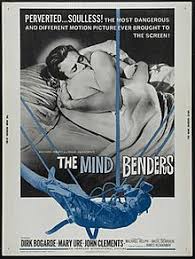
Professor Sharpey (Harold Goldblatt) is a researcher at Oxford University. He is in charge of a project called Isolation. Sharpey is doing experiments using a sensory deprivation tank. The subject is suspended in a tank of water with their ears and eyes covered. In the tank the subject is left for hours not being able to use any of their five senses. The experiments are designed to figure out how space flight would affect someone after a long period of time alone. Working with Sharpey are Dr. Harry Longman (Dirk Bogarde) and Dr. Danny Tate (Michael Bryant). Sharpey and even Longman have used themselves as guinea pigs.
The professor boards a train at Paddington Station. During the trip he steps off the moving train and falls to his death. The people with him in the train car state that he just got up from his seat and appears to have committed suicide. On the train is Major John Hall (John Clements). He is from MI5 and has been watching Sharpey. It appears that the professor had been passing secrets to the Soviet Union. It is assumed that he committed suicide out of shame for being a traitor. Major Hall believes there may be more to it than that. Hall visits Longman to learn more about Isolation.
Longman believes that the sensory deprivation experiments the Sharpey had been doing may be a contributing factor in his actions. Longman believes that the isolation chamber may have made Sharpey susceptible to suggestion, in effect brainwashing the professor. Longman agrees to undergo a similar test to prove that Sharpey isn’t a traitor but a victim. Longman spends eight hours in the tank alone. At the end of the session, he is taken out. To try to get Longman to do something he would normally never do, the two men plant a suggestion in Longman’s mind that he is not in love with his wife, Oonagh (Mary Ure). The experiment causes far more repercussions than either Hall or Tate could imagine.
“The Mind Benders” was released in 1963 and was directed by Basil Dearden. It is a British thriller and was based on the 1963 novel by James Kennaway.
Bogarde has a tendency to play dark and brooding characters, full of conflict and psychological issues. He is right in his element here. Playing more like a melodrama, the film is a sober look at brainwashing and the breakdown of one’s personality. Bogarde, who was believed to be homosexual, brings all the suppressed anguish and mental stress of his private life into a character that is battling different demons, ones that have been implanted into his subconscious. All of this makes the movie a bit depressing and Bogarde’s performance believable.
I heard a rumor somewhere that the film was actually based on real experiments in sensory deprivation done by scientists at McGill University and that such experiments were funded by the CIA in the 50’s. The experiments were initially intended to find a treatment for schizophrenia and depression. The experiments were headed by Dr. Donald Ewen Cameron. In addition to the sensory deprivation, patients were given LSD, and also curare, the latter to keep them paralyzed during the tests. The results were disastrous and sometimes created the very thing the experiments were supposed to cure. The patients were never given informed consent of the extent of the experiments, some of which violated the Nuremberg Code of ethics created after WWII. It isn’t known for sure if Cameron was aware that the CIA was footing the bill, but it is an interesting little tid-bit.

